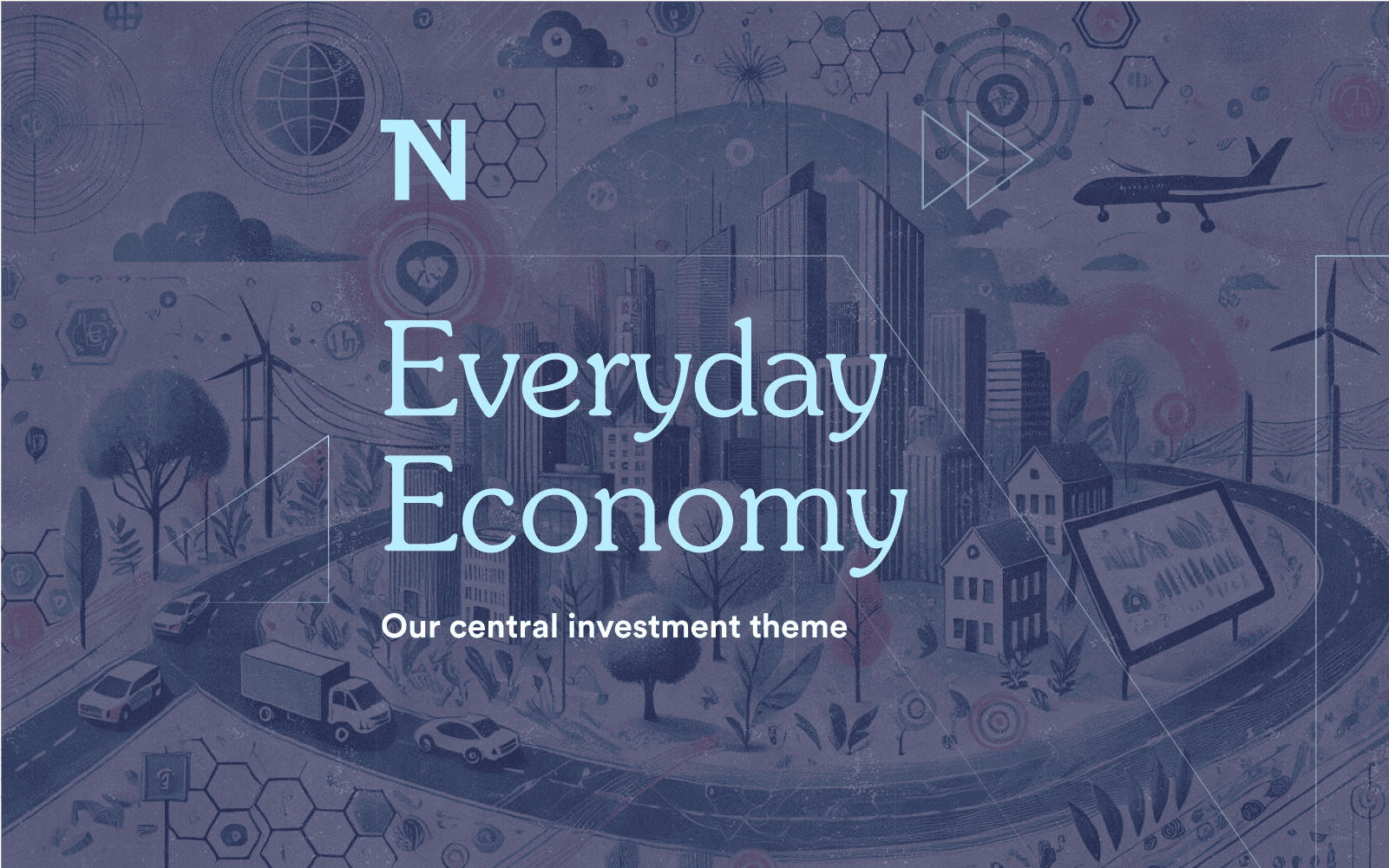


Bitcoins & Benjamins: The Future of Work & Money
As you may know, NextView now has a thematic investing focus on the redesign of the Everyday Economy. We’ve shared our thoughts on how the internet and associated digital technologies are creating massive shifts in home, apparel, and other categories. Next up is the topic of work and money.
What we call “work and money” covers a broad range of areas. It includes, but isn’t limited to, what is traditionally referred to as personal finance. For most folks, household financial matters are intrinsically linked with employment, and employment isn’t just the wages you bring home. Retirement savings [$27 trillion assets in U.S.], health insurance [49% is employer-based], and other key pillars of our economic well being are often provisioned through our employers.
People’s relationship with work has been changing, too. Freelancing, the gig economy, and new ways of acquiring work skills not only change how we find jobs but also how we think about careers. And to add more complexity to all of these matters, even our conceptions of money are changing with emerging technologies like the blockchain and cryptocurrencies.
The scope of digital tech for work and money, in terms of addressable markets, is almost mind-boggling. While any particular startup is likely to be focused on just one of these areas, here at NextView, we strive to think about them holistically and catch glimpses of shifts in long-term behavior. This post can’t cover them all, but here are some of the trends we’re keeping tabs on in the work and money space.
What’s Next for Work & Money?
Digital Insurance
In its first two decades, the internet brought significant change to many aspects of personal finance — particularly retail banking, retail brokerage and asset management, payments, and consumer lending. New entrants like E*TRADE, PayPal, LendingClub, and others led the way, but large incumbent financial institutions also capitalized on this opportunity. But until the last year or two, insurance has arguably been one of the last areas of personal finance that has largely been untouched by the digital revolution.
Health insurance is a somewhat distinct opportunity in the U.S. given nearly 85% of Americans receive medical insurance through their employer or the government (Medicare, Medicaid, VA). (Though even there, you’ve seen startups like Clover Health, Oscar, Devoted Health, and others grow rapidly.) But looking just at the property & casualty (home, auto, etc.) and life insurance segments, you see a $2T (yes, trillion) annual market where nearly all transactions occur offline.
Digital technologies enable innovation of the insurance “products” themselves at the same time broader changes occur in how, where, when, and why we use insurance. For example, historical life insurance policies require a doctor’s visit or blood work as part of the underwriting process (which can take 4–8 weeks to complete). Quilt (a NextView portfolio company incubated in our Boston office) recently launched a fully digital life insurance product that approves policies in just 15 minutes. Microinsurance (where one insures a particular item rather than all their belongings) and other types of innovation are also starting to emerge.
Retirement 2.0
While “work” has existed since the dawn of civilization and even money has been around for millennia, retirement is a thoroughly modern concept. Life expectancy was below 40 prior to the industrial revolution, so the concept of a period of retirement near the end of a lifetime of work didn’t exist. Under Chancellor Bismarck, Germany created the world’s first retirement pension system at the end of the 19th century. Then, pensions and similar retirement savings schemes proliferated in the 20th century across governments and employers.
But what about retirement in the 21st century?
Even in prosperous nations, many government-funded retirement savings systems are under financial strain. Employer-based pensions have largely disappeared in the U.S., replaced by elective contribution (aka 401k) systems that place far greater burden on individuals to actively manage their retirement savings prudently. Furthermore, as the nature of work changes — with individuals earning a living without a traditional paycheck (freelancers, gig economy, etc.) — how they save for retirement will inevitably need to change. It’s also conceivable that broader societal changes, like universal basic income (UBI), may alter how we think about retirement and financial security.
The internet has already changed how consumers research and manage their retirement savings, but we also believe there are opportunities to use digital technology to redesign how people create financial security in their golden years. Some possible scenarios include:
- Flexible work platforms emerge that enable people nearing the end of their careers to continue working (full-time, part-time, transitory gigs/projects) beyond traditional retirement ages.
- Consumers take greater control of directing their retirement savings. This doesn’t mean that everyone will become an active investor or asset allocator, but digital platforms like robo-advisors or personal pensionsenable consumers to save for retirement in the way that best suits them.
Blockchain & Cryptocurrencies
Many thoughtful entrepreneurs and VCs have already shared their thoughts on this topic, so I’ll keep ours briefer.
We are fairly skeptical that cryptocurrencies like Bitcoin or Ethereum will replace fiat currencies for everyday transactions. While BTC and ETH have blazed a train for broader cryptocurrency and token ecosystems, fiat currencies like the U.S. dollar still retain vastly broader acceptance, modularity (physical cash & digital value), regulatory advantage, and transactional scale (hard to compare centralized versus decentralized networks, but Visa can theoretically process 800x more transactions/second than a Bitcoin block as currently configured). While fiat currencies are unlikely to be replaced by BTC and ETH for mass market transactions, we think BTC and/or ETH may prosper as a digital store of wealth similar to how gold has been used for centuries, both during and after the hard money currency era.
It is still early days and there are risks and benefits for all participants in ICOs. But in addition to their inherent benefit as incentive mechanisms for distributed projects, they appear to be a useful new approach for certain types of organizations to raise funds — just as crowdfunding has been effective for everything from video game developers to hardware startups.
We are quite bullish that blockchain technology and distributed ledgers will fundamentally change various transaction and record-keeping businesses from securities clearing to notaries to property deeds. We also believe blockchain will enable novel distributed services that do not presently exist, for lack of a scalable real-time architecture for managing microtransactions.
Financing Life’s Big Tickets
During the 20th century, the two biggest purchases most people made were a home and an automobile. As a result, residential mortgage and auto lending industry became monstrous pillars in consumer finance. Then, towards the end of the 20th century, a third huge financial pillar emerged for a large portion of the U.S.: education. Today, nearly everyone thinks about the affordability of a home, an education (whether traditional college or other forms), and an automobile. We believe that provisioning for the expense of all three of these big tickets will remain key parts of everyone’s finances.
We touched on new approaches to financing a home purchase in Rob’s post on the future of housing. Despite changing circumstances and preferences impacting the nature of housing, we still believe most people will seek to purchase their own dwelling at some point in life, and digital technologies will enable novel ways to finance that purchase.
Ride-sharing networks and autonomous vehicles will undoubtedly change auto ownership rates. But private ownership of cars is likely to exist even in this bold new future at some level, and mobility will be a significant household expenditure, regardless of what form it takes.
And individuals and families will have an increased focus on financing their education beyond high school, whether that’s a four-year college degree, some form of vocational training, a code academy, lifelong career learning, or something else entirely.
So these are some of the challenges we’re thinking about within the broad realm of work and money. As we’ve said before, as seed-stage investors, we think broadly about these opportunities and the interconnectedness of many of them. But thoughtful entrepreneurs on the front lines are spending 110% of their time digging into these areas in a much more focused way. If you’re a founder redesigning how we think about work and money, we welcome the opportunity to talk with you more.





